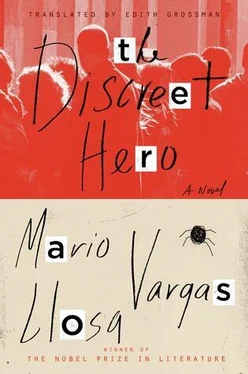“Read it to me, Felícito,” she said, giving it back to him. “I can see it’s not a love letter, hey waddya think.”
She listened very seriously as he read her the letter. When he finished, she made a mocking pout and spread her arms. “Waddya want me to say, baby?”
“Tell me if this thing is serious, Adelaida. If I ought to worry or not. Or if it’s just a lousy trick. Clear this up for me, please.”
The holy woman gave a laugh that shook her entire hefty body hidden beneath the wide mud-colored tunic.
“I’m not God — I don’t know those things,” she exclaimed, raising and lowering her shoulders and fluttering her hands.
“Your inspiration doesn’t tell you anything, Adelaida? In the twenty-five years I know you, you never gave me bad advice. It’s always useful. I don’t know what my life would’ve been without you, comadre. Can’t you tell me something now?”
“No, baby, nothing,” Adelaida said, pretending to be sad. “No inspiration comes to me. I’m sorry, Felícito.”
“Well, what can you do,” the businessman said, taking out his wallet. “When it’s not there, it’s not there.”
“Waddya giving me money for if I couldn’t give you advice?” Adelaida protested. But in the end she slipped the twenty-sol bill that Felícito insisted she accept into her pocket.
“Can I sit here for a while in the shade? I’m worn out with so much running around, Adelaida.”
“Sit down and rest, baby. I’ll bring you a glass of nice cool water fresh from the filtering stone. Just make yourself comfortable.”
While Adelaida went to the rear of the store and then came back, Felícito examined in the half-light the silvery cobwebs hanging from the ceiling, the ancient shelves with packets of parsley, rosemary, coriander, and mint, and boxes of nails, screws, seeds, eyelets, and buttons, the prints and images of the Virgin, of Christ, of male and female saints and holy men and women cut from magazines and newspapers, some with lit candles in front of them and others with adornments — rosaries, amulets, and wax or paper flowers. It was because of those images that in Piura she was called a holy woman, but in the quarter century he’d known her, Adelaida had never seemed very religious to Felícito. He’d never seen her at Mass, for example. And people said the parish priests considered her a witch. Sometimes the street kids shouted at her: Witch! Witch! It wasn’t true, she didn’t do witchcraft like so many sharp-witted cholas in Catacaos and La Legua who sold potions for falling in love, falling out of love, or bringing bad luck, or the medicine men from Huancabamba who passed a guinea pig over the infirm, or the ones in Las Huaringas who thrust their hands into the afflicted, who paid them to be free of their ailments. Adelaida wasn’t even a professional fortune-teller. She did that work only occasionally and only with friends and acquaintances, not charging them a cent. Though if they insisted, she’d keep the little gifts they were moved to give her. Felícito’s wife and sons (as well as Mabel) mocked him for the blind faith he had in Adelaida’s inspirations and advice. He not only believed her; he’d become fond of her. He regretted her solitude and her poverty. She had no husband or family he knew of; she was always alone but seemed content with her hermit’s life.
He’d seen her for the first time a quarter of a century earlier, when he was an interprovincial truck driver and didn’t have his transport company yet, though he dreamed night and day about owning one. It happened at kilometer 50 on the Pan-American Highway, in one of those settlements where bus drivers, truck drivers, and jitney drivers always stopped to have chicken soup, coffee, a shot of chicha, and a sandwich before facing the long, burning-hot run through the Olmos desert filled with dust and stones, devoid of towns, without a single gas station or repair shop in the event of an accident. Adelaida, who already wore the mud-colored tunic that would always be her only article of clothing, had one of the stands that sold dried meat and soft drinks. Felícito was driving a truck loaded with bales of cotton from Casa Romero to Trujillo, traveling alone because his helper had backed out of the run at the last minute when Hospital Obrero informed him that his mother had fallen very ill and might pass at any moment. He was eating a tamale, sitting at Adelaida’s counter, when he noticed her giving him a strange look with her deep-set, piercing eyes. Hey waddya think, what was the matter with the woman? Her face was contorted. She looked frightened.
“What’s wrong, Señora Adelaida? Why are you looking at me like that, like you suspected something?”
She didn’t say anything. She continued to stare at him with her large, dark eyes and made a face that showed repugnance or fear, sucking in her cheeks and wrinkling her brow.
“Do you feel sick?” an uncomfortable Felícito asked.
“Better if you don’t get in that truck,” she said finally in a hoarse voice, as if making a great effort to control her tongue and throat. She gestured with her hand toward the red truck Felícito had parked at the side of the road.
“Don’t get in my truck?” he repeated, disconcerted. “And why not, if you don’t mind my asking?”
Adelaida moved her eyes away from him for a moment to look to either side, as if she were afraid that the other drivers, customers, or owners of the shops and bars in the vicinity, might hear her.
“I have an inspiration,” she said, lowering her voice, her face still upset. “I can’t explain it to you. Just believe what I’m telling you, please. Better if you don’t get in that truck.”
“I appreciate your advice, señora, and I’m sure you mean well. But I have to earn my bread. I’m a driver, I make my living with trucks, Doña Adelaida. How would I feed my wife and two little boys if I didn’t?”
“Then at least be very careful,” the woman begged, lowering her eyes. “Listen to me.”
“I’ll do that, señora. I promise. I always am.”
An hour and a half later, at a curve on the unpaved road, the bus from La Cruz de Chalpón came skidding and screeching out of a thick, grayish-yellow cloud of dust and hit his truck with a great clamor of metal, brakes, shouts, and squealing tires. Felícito had good reflexes and managed to swerve, turning the front part of the truck out of the way, so that the bus crashed into the chute and cargo, which saved his life. But until the bones in his back, shoulder, and right leg healed, he was immobilized in a sheath of plaster that not only hurt but also caused a maddening itch. When he was finally able to drive again, the first thing he did was go to kilometer 50. Señora Adelaida recognized him right away.
“Well, well, I’m glad you’re better now. The usual tamale and a soda?”
“I beg you, Señora Adelaida, for the sake of what you love best, tell me how you knew the bus from La Cruz de Chalpón would run into me. It’s all I think about ever since it happened. Are you a witch, a saint, or what?”
He saw her turn pale, and she didn’t know what to do with her hands. She lowered her head in confusion.
“I didn’t know anything about that,” she stammered, not looking at him, as if she’d been accused of something very serious. “I just had an inspiration, that’s all. It happens sometimes, I never know why. And hey waddya think, I don’t want it to happen, I swear. It’s a curse that’s fallen on me. I don’t like it that Almighty God made me like this. I pray every day for Him to take back this gift He gave me. It’s something terrible, believe me. It makes me feel like I’m to blame for all the bad things that happen to people.”
“But what did you see, señora? Why did you tell me that morning it would be better not to get into my truck?”
Читать дальше

![Гарри Гаррисон - Bill, the Galactic Hero [= The Starsloggers]](/books/87536/garri-garrison-bill-the-galactic-hero-the-star-thumb.webp)










